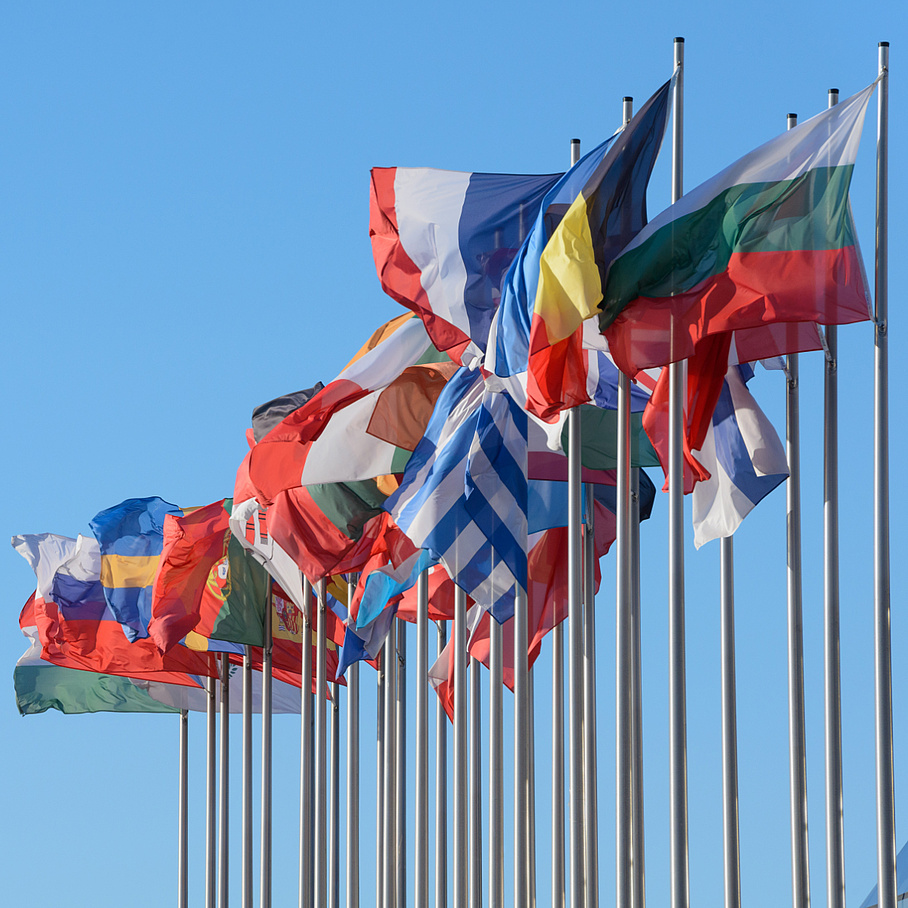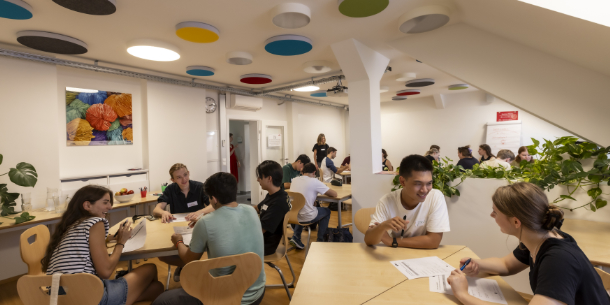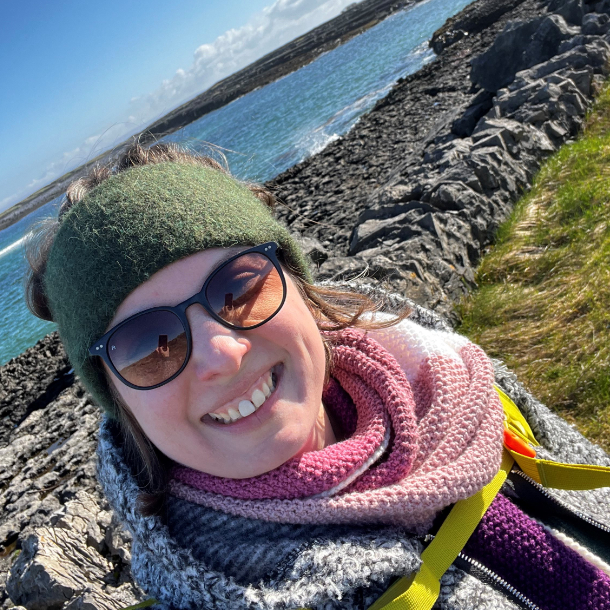- Current programme generation 2021‒2027
- Which countries are eligible to participate in the Erasmus+ programme?
- Erasmus+ Priorities
- Erasmus+ Key Actions
- Stays in Erasmus+ programme countries
- Stays in Erasmus+ partnership countries
The programme aims to promote study and work experience abroad for students, teachers and university staff and is therefore an integral part of the TU Graz internationalisation strategy. In the Erasmus+ Policy Statement, TU Graz committed to the principles of the Erasmus+ Charter for Higher Education. The Erasmus+ Student Charter sets out the rights and obligations of Erasmus+ students.

- agreements@tugraz.at (for inter-institutional agreements)
- erasmus@tugraz.at (for general information on the Erasmus+ programme)

Current programme generation 2021‒2027
For the programme period 2021‒2027, the EU has increased resource spending, earmarking more than EUR 26 billion for the next generation of Erasmus+ programmes. This is almost twice as much as was allocated for the programme period 2014–2020. By increasing funding, the European Commission is highlighting the importance of international mobility.
Graz University of Technology qualified for an Erasmus Charter for Higher Education 2021‒2027 (ECHE for short) and is therefore allowed to once again participate in the Erasmus+ programme from 2021‒2027.
The International Office – Welcome Center handles coordination of the programme for TU Graz on a centralised basis.

The current Erasmus+ programme period enables funding of Blended Intensive Programmes (BIP for short) in addition to funding individual mobility.
Erasmus+ priorities
In the programme period 2021–2027, the Erasmus+ programme sets four priorities:
The programme aims to promote equal opportunities and access, inclusion, diversity and fairness across all its actions. Students and employees with fewer opportunities as well as underrepresented groups are at the heart of these objectives.
To address the needs of people with fewer opportunities, additional funding is therefore made available to support students who are parents and wish to go abroad with their children as well as students who have a disability and/or chronic illness. In addition, students and employees with disabilities and/or chronic illnesses are eligible to apply for inclusion support. Furthermore, recipients of study assistance may also apply for study abroad grants and tuition fee waivers.
TU Graz sets particularly high standards in this regard, applying a transparent selection process and cooperating closely with the Accessible Learning and Accessible Working departments.
![Jonas Wolfsberger. Source: private [Translate to Englisch:] Familie mit Elch](https://www.tugraz.at/fileadmin/user_upload/tugrazInternal/Studium/International_studieren_und_lehren/Mobilitaetsprogramme/Erasmus_Kooperationen/Familie_mit_Elch._Bildquelle_Privat..jpg)
Jonas Wolfsberger went to Aalto University in Helsinki for his 2022 winter semester together with his daughter and his girlfriend.
For us, the stay in Helsinki was a wonderful experience that brought us closer together as a family. We were able to try out a lot of new things and experience a new culture with all its traditions. We found Finland to be a very family-friendly country and we were able to quickly get to know new people through the various play groups for children.
We also fondly remember the excellent university and public transport system in Finland, and of course the great experiences that our daughter was able to make. When you go abroad with a child on the Erasmus+ scheme, you also receive support in addition to the regular scholarship, which was also immensely helpful for us. We can definitely recommend staying abroad as a family.
One of the major objectives for the cooperation between European higher education institutions is the digital transformation of the Erasmus+ programme.
The related goals for supporting European citizens of all ages in acquiring digital skills and expertise are summarised in the Digital Education Action Plan (2021‒2027). As a European Student Card Initiative university, TU Graz is currently playing a pioneering role in implementing Erasmus Without Paper.
![Martin Ebner. Source: private [Translate to Englisch:] Person standing in a lecture hall and giving a speech](https://www.tugraz.at/fileadmin/_processed_/c/4/csm_Testimonial_Martin_Ebner_by_Martin_Ebner_bfa3947088.jpg)
Martin EBNER, Head of the Educational Technolog Unit, TU Graz
With its high digital standards and participation in the European alliance UNITE! including active involvement in the European Student Card Initiative, TU Graz is setting an important example for the future of higher education. We are actively shaping a European digital education system that offers students seamless and sustainable access to educational resources - mobile, open and networked. I personally see these developments as an essential step towards a common (digital) European education area.
Integrating the programme into the European Green Deal and taking environmental and climate protection into account when implementing all activities is of utmost importance. This starts with promoting environmentally friendly international mobility but also includes raising awareness of sustainability and the ecological footprint so as to effectively reduce negative environmental impacts with regard to programme implementation.
From the academic year 2024/2025, students who arrive and depart in a climate-friendly manner will therefore receive an increased travel allowance. This incentive is also in line with the roadmap to reaching climate neutrality at TU Graz by 2030.
![Fabian Kabas. Source: private [Translate to Englisch:] two people with bikes standing in front of the sea](https://www.tugraz.at/fileadmin/_processed_/a/3/csm_Testimonail_Fabian_Kabas_by_Fabian_Kabas_090f4c366b.jpg)
Fabian KABAS, exchange year abroad at the Universidade de Lisboa in the 2024/25 academic year
While I was talking to my girlfriend about my desire to do an Erasmus+ stay in Lisbon, the topic of cycling came up - and I quickly realised that I wanted to travel there by bike. The idea of travelling a distance under my own steam that many people only do by plane excited me. My friend Sebastiano was immediately on board. Together we planned the route, looked for accommodation, optimised our packing list and trained. Starting in Graz, we first set off in the company of cycling friends and then visited relatives and acquaintances along the way. The 30-day journey was decelerating, intense and full of impressions - landscapes, sounds, smells and cultures were constantly changing. We shared stories and experiences with other travellers and locals.
The journey was therefore much more than just the way to the destination - it became an experience. I can only recommend a sustainable journey to exchange students: It decelerates, connects and remains unforgettable (at least for me).
The Erasmus + programme aims to address the limited citizen participation in democratic processes and their lack of knowledge about the European Union while also increasing understanding and awareness of European values. The related projects are intended to promote active citizenship, develop social and intercultural skills and increase appreciation for the European community.
If students would like to get actively involved at TU Graz in this regard, they can volunteer as a buddy for international students. True to the motto “Be a buddy – be a friend,” local students support international students who are getting settled in Graz. This way, they can improve their foreign language skills, build international friendships and receive the “Buddy Certificate,” which gives them an advantage when applying abroad.
![Laila Zildic. Source: private [Translate to Englisch:] Person standing in front of a building](https://www.tugraz.at/fileadmin/_processed_/c/6/csm_Testimonail_Laila_ESA24_by_Laila_ZILDZIC_854b7e7069.jpg)
Laila ZILDŽIĆ, SURE! student of the degree programme Software Engineering and Management; participant in the European Student Assembly 2024
Europe thrives on exchange - and that's exactly what I experienced at the European Student Assembly 2024. Three days in the European Parliament, intensive discussions with students from all over Europe and joint recommendations on the future of the EU - that was democracy in action.
As I believe that technology is just as important for political decisions as the humanities and social sciences, I applied for the ESA to be part of the panel on the EU AI Act. There I was able to contribute my technical knowledge and at the same time learn a lot about European politics and decision-making processes.
This special experience was made possible for me by TU Graz and the UNITE! alliance. What I particularly appreciate about UNITE! is the open, international exchange between nine European partner universities - a real opportunity to experience and actively shape European values such as diversity, solidarity and democracy.
Erasmus+ Key Actions
The Erasmus+ programme is structured around the following Key Actions:
The mobility of students and employees is a key concern for Erasmus+, thus the programme offers the following opportunities:
Erasmus+ promotes projects that aim for increased cooperation among organisations and institutions. Such projects are the best way to ensure the exchange of best practices, the use of new technologies, the development of innovative teaching and learning methods as well as the support of non-formal learning, and the development of shared tools and activities at the local, regional, national or European level. More information for TU Graz employees:
- Cooperation partnerships
- Alliances for Innovation
- Capacity building in higher education
- Erasmus mundus
This Key Action is geared towards increased cooperation on policies, thus resulting in contributions to the development of new policies that can lead to modernisation and reforms in the areas of education, training, youth and sport at the European Union and system level.
More information for TU Graz employees: Jean Monnet Aktionen

Erasmus+ Outgoing Coordinator
My Erasmus+ semester abroad allowed me to live a completely different life for a few months ‒ a life that I still think back to very fondly to this day. During my time abroad, I grew both as a person and in my academic field and made many wonderful international friendships that I continue to cultivate. As an Erasmus+ coordinator, I care deeply and want to ensure that our students return to TU Graz with the same positive experience as I once did.
Which countries are eligible to participate in the Erasmus+ programme?
Erasmus+ programme countries are all EU Member States as well as third countries associated to the programme, such as Iceland, Liechtenstein, North Macedonia, Norway, Serbia and Türkiye. These countries may participate without restrictions in all Erasmus+ activities.
Erasmus+ partnership countries are third countries not associated to the programme that can participate in certain internationally oriented actions within the framework of the Erasmus+ International Credit Mobility Program (E+ ICM).
More information
Stays in Erasmus+ programme countries
Through the Erasmus+ programme KA131 (Europe), TU Graz can support stays abroad for students, teachers and employees in programme countries. In return, the programme also offers international members of higher education institutions the opportunity to stay at TU Graz. These stays are funded by the partner university.

Erasmus+ for outgoing students
Students stay at a partner university for between two and twelve months per study cycle. Furthermore, they have the option of short-term stays as part of a blended intensive programme or completing internships abroad.

I want to work for an international company in the future and therefore wanted to network with people from other nations regarding careers and education. During my stay abroad, I socialised with people from all over the world, and these contacts have now developed into beautiful friendships.

The Erasmus+ programme allows me to study in Austria for a whole year and make the best of this opportunity. Thanks to the support of TU Graz and the numerous events organised by ESN (Erasmus+ Student Network), I settled in well in Graz right from the start.
Erasmus+ for staff
TU Graz employees can make use of an Erasmus+ teaching period or Erasmus+ training period at a partner university or welcome staff from European and international Erasmus+ programme universities to TU Graz.

Outgoing staff mobility
Incoming staff mobility
- Erasmus+ teaching periods at TU Graz
- Erasmus+ training periods at TU Graz
An Erasmus+ continuing education stay at TU Graz is panned, organised and carried out independently by the respective person in coordination with the respective department. No inter-institutional agreement is required for a continuing education stay at TU Graz. The relevant documents (Mobility Agreement and Confirmation of Stay) are signed directly by the respective department at TU Graz.

Science communication TU Graz
My Erasmus+ stays have taken me to Ireland twice and to Italy once ‒ always for language courses and always for the maximum period of two weeks. It is a wonderful experience to practise a language in everyday life and to completely immerse yourself in it.
Organising the stays requires a lot of effort, but the International Office helps in every way they can and has always made it very easy for me. I would do it all again any day ‒ in fact, I’ll soon be off to Scotland for the next language training.
BIP (Blended Intensive Programme)
A Blended Intensive Programme (BIP) is a short, intensive curriculum developed and implemented in international cooperation between three or more higher education institutions holding an ECHE. This programme combines mandatory physical mobility with a virtual component. Both students and employees can take part in a BIP.
More information for students. More information for employees can be found in TU4U.

The BIP gave master’s or doctoral degree students from various fields of study the opportunity to learn about the potential of high-pressure processes for various applications in different industries. Such a comprehensive course is not offered anywhere else.
So far, the programme has been taken by 33 students from 17 nations and 23 teachers from 10 nations, receiving highly positive feedback: The intensive knowledge transfer and, above all, the friendships formed during the 14-day stay last a lifetime and make the programme unique. The mutual exchange with teachers encourages and nurtures ideas for future joint projects and collaborations. Any prejudices regarding religion, gender, origin, etc. can be eliminated.
Stays in ICM (International Credit Mobility) Erasmus+ partnership countries
Through the Erasmus + programme KA 171 (worldwide), TU Graz can promote the mutual exchange of students and employees with partner universities worldwide. The associated application process is very labour-extensive and should therefore be undertaken specifically to facilitate long-term, stable collaboration in which a mutual exchange is desirable and realistic.
Outgoing: Stays at institutions in eligible Erasmus+ partnership countries
Incoming: Stays at TU Graz from institutions in eligible Erasmus+ partnership countries
-
Erasmus+ ICM study period and traineeship at TU Graz
This programme offers students from our partnership universities the opportunity to spend a minimum of two to a maximum of five months at TU Graz. The International Office ‒ Welcome Center connects students with researchers at TU Graz, whose research projects the students then work on as part of their traineeship.
More information: Research at TU Graz
Students may receive an Erasmus+ mobility grant and a travel allowance via Erasmus+ ICM funding.
-
Erasmus+ ICM teaching and training period at TU Graz
Staff of partner universities may also receive funding for a teaching and training period at TU Graz for a maximum of seven days (including travel days).
Inter-institutional agreement
A valid inter-institutional agreement (IIA) with the respective higher education institution is a prerequisite for mobilities related to study and teaching periods. These agreements are prepared in coordination with the coordinators responsible for the respective field of study as well as in consultation with the international cooperation partners and with the support of the International Office ‒ Welcome Center. If the conditions for long-term cooperation are met, the agreement is then signed, preferably digitally.
No inter-institutional agreement is necessary for traineeships for students and training periods for staff.

E+ ICM incoming Trainee
In the field of sustainability, international collaboration is essential to solving environmental challenges that transcend borders. Through the Erasmus+ ICM program, I gained insights into European approaches that I can apply to my future career. With the support of TU Graz, I’ve had the privilege of building meaningful experiences that have enhanced both my professional and personal development.
Funded by the European Union. Views and opinions expressed are however those of the author(s) only and do not necessarily reflect those of the European Union or OeAD-GmbH. Neither the European Union nor the granting authority can be held responsible for them.

